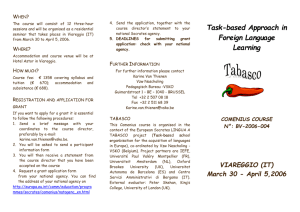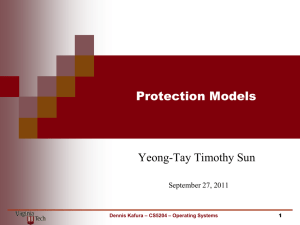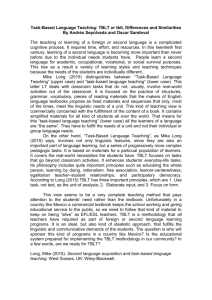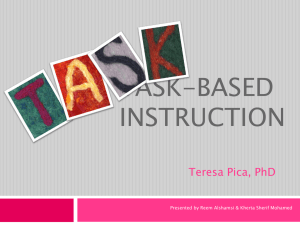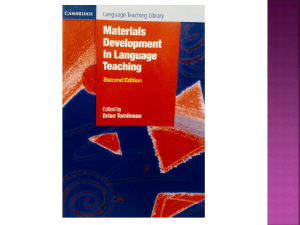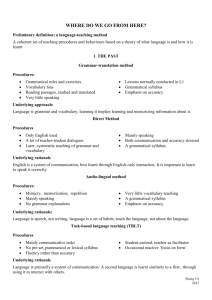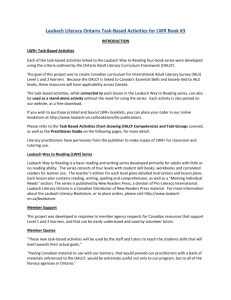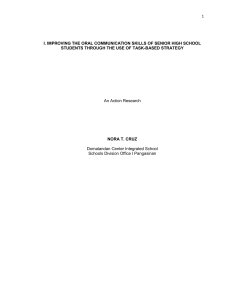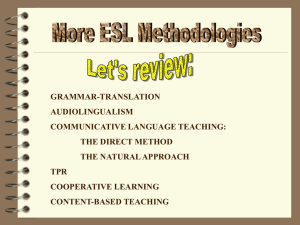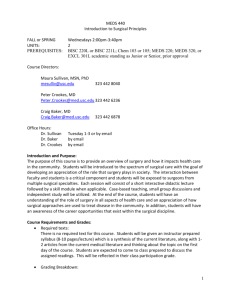Some reflections on task-based language performance assessment
advertisement
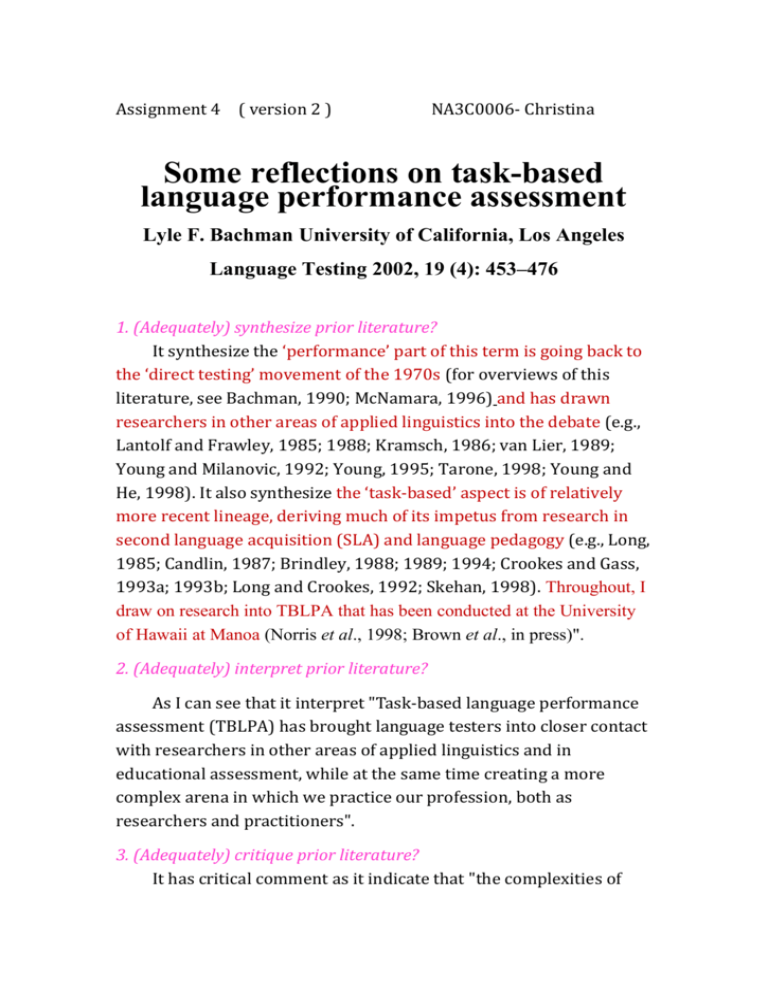
Assignment 4 ( version 2 ) NA3C0006- Christina Some reflections on task-based language performance assessment Lyle F. Bachman University of California, Los Angeles Language Testing 2002, 19 (4): 453–476 1. (Adequately) synthesize prior literature? It synthesize the ‘performance’ part of this term is going back to the ‘direct testing’ movement of the 1970s (for overviews of this literature, see Bachman, 1990; McNamara, 1996) and has drawn researchers in other areas of applied linguistics into the debate (e.g., Lantolf and Frawley, 1985; 1988; Kramsch, 1986; van Lier, 1989; Young and Milanovic, 1992; Young, 1995; Tarone, 1998; Young and He, 1998). It also synthesize the ‘task-based’ aspect is of relatively more recent lineage, deriving much of its impetus from research in second language acquisition (SLA) and language pedagogy (e.g., Long, 1985; Candlin, 1987; Brindley, 1988; 1989; 1994; Crookes and Gass, 1993a; 1993b; Long and Crookes, 1992; Skehan, 1998). Throughout, I draw on research into TBLPA that has been conducted at the University of Hawaii at Manoa (Norris et al., 1998; Brown et al., in press)". 2. (Adequately) interpret prior literature? As I can see that it interpret "Task-based language performance assessment (TBLPA) has brought language testers into closer contact with researchers in other areas of applied linguistics and in educational assessment, while at the same time creating a more complex arena in which we practice our profession, both as researchers and practitioners". 3. (Adequately) critique prior literature? It has critical comment as it indicate that "the complexities of task-based language performance assessment (TBLPA) are leading language testers to reconsider many of the fundamental issues about what we want to assess, how we go about it and what sorts of evidence we need to provide in order to justify the inferences and decisions we make on the basis of our assessments". "I discuss what I see as some of the problems with attempts to predict task difficulty on the basis of so-called ‘task difficulty features’, as well as what I see as a fundamental contradiction in the way we presently problematize the notion of task difficulty". 4. Are the references included relevant? Yes, the references of the research are relevant, as I can see "going back to the ‘direct testing’ movement of the 1970s (for overviews of this literature, see Bachman, 1990; McNamara, 1996) and has drawn researchers in other areas of applied linguistics into the debate (e.g., Lantolf and Frawley, 1985; 1988; Kramsch, 1986; van Lier, 1989; Young and Milanovic, 1992; Young, 1995; Tarone, 1998; Young and He, 1998). The ‘task-based’ aspect is of relatively more recent lineage, deriving much of its impetus from research in second language acquisition (SLA) and language pedagogy (e.g., Long, 1985; Candlin, 1987; Brindley, 1988; 1989; 1994; Crookes and Gass, 1993a; 1993b; Long and Crookes, 1992; Skehan, 1998). "I draw on research into TBLPA that has been conducted at the University of Hawaii at Manoa (Norris et al., 1998; Brown et al., in press)". 5. Are the reviewed references current? I think that part of the reviewed references are not the latest references. (for overviews of this literature, see Bachman, 1990; McNamara, 1996) and has drawn researchers in other areas of applied linguistics into the debate (e.g., Lantolf and Frawley, 1985; 1988; Kramsch, 1986; van Lier, 1989; Young and Milanovic, 1992; Young, 1995; Tarone, 1998; Young and He, 1998). The ‘task-based’ aspect is of relatively more recent lineage, deriving much of its impetus from research in second language acquisition (SLA) and language pedagogy (e.g., Long, 1985; Candlin, 1987; Brindley, 1988; 1989; 1994; Crookes and Gass, 1993a; 1993b; Long and Crookes, 1992; Skehan, 1998). The exception is "Throughout, I draw on research into TBLPA that has been conducted at the University of Hawaii at Manoa (Norris et al., 1998; Brown et al., in press)". 6. Is the scope (breadth and depth) of LW adequate? Yes, the scope of LW is adequate. I can see in the part Ⅰ "Introduction", part Ⅱ "Tasks and constructs in language assessment and part Ⅲ "What is this thing called task?’: Content domain specification". 7. Adequately introduce the research background/context? "Task-based language performance assessment (TBLPA) has brought language testers into closer contact with researchers in other areas of applied linguistics and in educational assessment, while at the same time creating a more complex arena in which we practice our profession, both as researchers and practitioners", should be the background of the research. 8. Adequately justify RQ’s /purposes or define research issues proposed? It address one claim of TBLPA is that such assessments can be used to make predictions about performance on future language use tasks outside the test itself. The author argues that there are several problems with supporting such predictions. These problems are related to task selection, generalizability and extrapolation. Because of these problems, current approaches to using task characteristics alone to predict difficulty are unlikely to yield consistent or meaningful results. That is why the research proposed. 9. Review literature in terms of research findings? "Clearly, task specification will also present challenges to such an integrated approach. Nevertheless, an integrated approach, in my view, makes it possible for test-users to make a variety inferences about the capacity for language use that test-takers have, or about what they can or cannot do. Furthermore, it makes available to test-developers the full range of validation arguments that can be developed in support of a given inference or use", should be research findings. 10. Review literature in terms of research methods? "I discuss this research because it is the most fully conceptualized, operationalized and researched exemplification of this approach of which I am familiar.", from this sentence I think that the method will be quantitative research. 11. Review literature in terms of significance of study? I think that the significance of study should be "I first discuss some of the distinctions that have been made between ‘task-centred’ and ‘ability’ or ‘construct-centred’ approaches to language assessment, and the claims that have been made for a task-based approach. I then discuss some issues related to supporting one kind of use – prediction of future performance – that has been claimed for TBLPA. Next, I discuss what I see as some of the problems with attempts to predict task difficulty on the basis of so-called ‘task difficulty features’, as well as what I see as a fundamental contradiction in the way we presently problematize the notion of task difficulty". 12. Review literature in terms of other aspects? In terms of other aspects I think that it provide a number of suggestions for both language testing research and practice as a way forward for investigating these issues.
